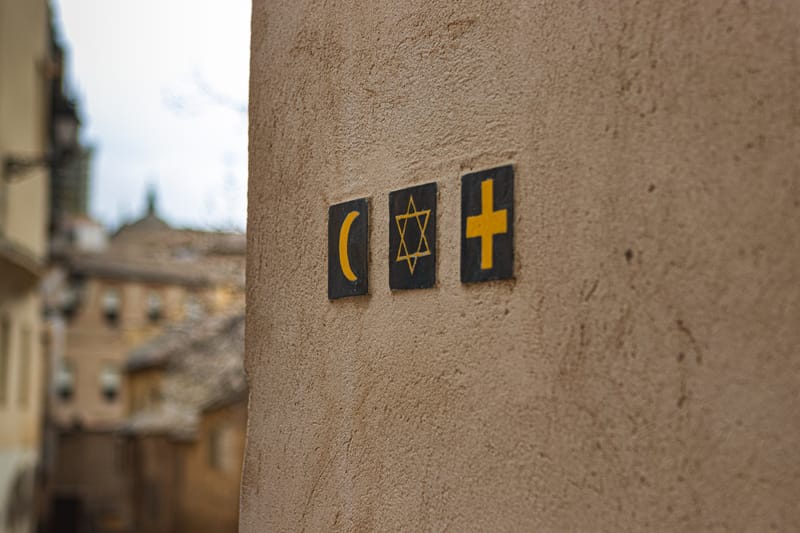Religion

Religion is a complex and multifaceted concept that can mean different things to different people. Generally, it refers to a set of beliefs, practices, and institutions that pertain to the relationship between humanity and a higher power or powers. This can include the belief in one or more deities, the belief in a spiritual or supernatural realm, or the belief in a moral code or way of life that is guided by a higher power.
Religion often includes specific rituals and practices, such as prayer, meditation, and sacrifice, which are believed to connect individuals with the higher power or powers. Many religions also have a set of teachings or doctrines that provide guidance on how to live one's life and how to achieve salvation or enlightenment.
Religion can play an important role in shaping an individual's identity, beliefs, and values. It can also serve as a source of community and social support, providing individuals with a sense of belonging and purpose. Additionally, some religious traditions have played a significant role in shaping the culture and history of various societies and continue to influence political, economic and social aspects of different countries.
It's worth noting that religion can manifest itself in different ways, it can be practiced individually or in groups, be organized or unorganized, be monotheistic or polytheistic, be based on texts or oral traditions, among other variations. Additionally, one's religious beliefs can evolve over time and can be influenced by personal experiences, cultural and societal factors, and exposure to other religious traditions.
Religions have many similarities and differences, and it's important to note that this is a vast topic that can't be fully covered in this little piece.. However, this is a general overview of some of the similarities and differences between the world's religions.
Similarities:
Most religions have a concept of a higher power or divine being, and many have a belief in an afterlife.
Many religions have a set of moral principles or code of conduct that followers are expected to abide by.
Many religions have a sense of community and a set of rituals or practices that followers participate in.
Many religions have a historical or legendary figure that is considered to be a founder or leader.
Many religions have a concept of love and compassion towards others, and the importance of the well-being of the community.
Differences:
Different religions have different beliefs about the nature of the divine, the afterlife, and the meaning of life.
Different religions have different moral principles and codes of conduct.
Different religions have different rituals and practices.
Different religions have different historical or legendary figures that are considered to be founders or leaders.
Different religions have different ways of expressing their beliefs and practices, and different ways of interpreting their sacred texts.
Please note that within each religion there are also many different sects and denominations, each with their own unique beliefs and practices. Additionally, people's understanding and interpretation of their religion can vary greatly from person to person. To gain a more balanced understanding and the bigger picture it's important to approach this topic with an open mind, respect, and sensitivity towards the beliefs of others. It's a good idea to remember that religions are complex and multifaceted and that this brief overview only scratches the surface of the similarities and differences between them.
The psychology of religion refers to the psychological aspects of religious belief, behaviour, and experience. It encompasses a wide range of topics including the cognitive, emotional, and social processes that underlie religious beliefs and practices. Some key areas of study within the psychology of religion include:
The cognitive processes involved in religious belief, such as how people form and maintain religious beliefs, how they interpret religious texts, and how they make sense of religious experiences.
The emotional and motivational aspects of religious behaviour and experience, including how religious beliefs and practices affect emotions, motivation, and well-being.
The social and cultural context of religious beliefs and practices, including how religious beliefs and practices are shaped by cultural and societal factors, and how they influence social interactions and relationships.
The relationship between religious beliefs and mental health, including how religious beliefs and practices may affect mental health and well-being, and how they may be used in the treatment of mental health conditions.
The development of religious beliefs and practices across the lifespan, including how religious beliefs and practices change over time and how they are influenced by developmental and life events.
The relationship between religious beliefs and other aspects of personality, such as moral reasoning, self-esteem, or self-concept.
It's worth noting that there is no single psychological perspective on religion, and the field of psychology of religion encompasses a wide range of theories, methods, and perspectives. Additionally, the relationship between religion and psychology is complex and multifaceted, and research in this area continues to evolve.
Religion: the belief in and worship of a superhuman controlling power, especially a personal God or gods.
Religion has apparently been with humans since before recorded history. The Wikipedia entry " Timeline of religion " has the earliest evidence of religion linked with the earliest known burial of a human at 100,000 BCE.
The study of religion rather than the belief is called religious studies.
religious history begins with the invention of writing about 5,220 years ago (3200 BC).
The prehistory of religion involves the study of religious beliefs that existed prior to the advent of written records.
